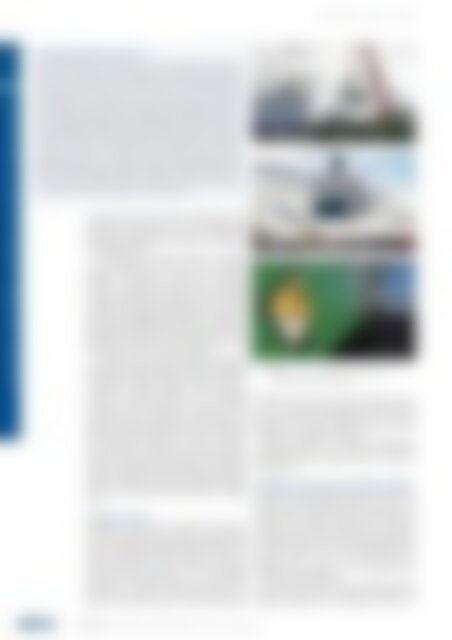atw - International Journal for Nuclear Power | 06.2021
Ever since its first issue in 1956, the atw – International Journal for Nuclear Power has been a publisher of specialist articles, background reports, interviews and news about developments and trends from all important sectors of nuclear energy, nuclear technology and the energy industry. Internationally current and competent, the professional journal atw is a valuable source of information. www.nucmag.com
Ever since its first issue in 1956, the atw – International Journal for Nuclear Power has been a publisher of specialist articles, background reports, interviews and news about developments and trends from all important sectors of nuclear energy, nuclear technology and the energy industry. Internationally current and competent, the professional journal atw is a valuable source of information.
www.nucmag.com
- No tags were found...
Create successful ePaper yourself
Turn your PDF publications into a flip-book with our unique Google optimized e-Paper software.
<strong>atw</strong> Vol. 66 (2021) | Issue 6 ı November<br />
FEATURE | DECOMMISSIONING AND WASTE MANAGEMENT 10<br />
Previous repatriations from France<br />
Until 2005, spent fuel elements from the operation of German<br />
nuclear power plants were transported to the United Kingdom and<br />
France <strong>for</strong> reprocessing. The radioactive waste produced during<br />
reprocessing has to be returned to Germany. The GNS Gesellschaft<br />
für Nuklear-Service mbH has been commissioned by the German<br />
nuclear power plant operators to prepare and undertake the return<br />
of this waste to German interim storage facilities. Between 1996 and<br />
2011, GNS already undertook twelve transports to the central interim<br />
storage facility in Gorleben, Lower Saxony; these transports involved<br />
a total of 108 large casks filled with vitrified high-level radioactive<br />
waste from the reprocessing of German fuel elements in the French<br />
reprocessing plant in La Hague. The sometimes sizeable protests<br />
against the transports, extensive discussions on the political level and<br />
within society, and days of media coverage, resulted in these transports,<br />
which were generally known as “Castor transports”, becoming<br />
a symbol of the resistance against nuclear energy.<br />
responsible <strong>for</strong> the security of the transport, gave notification<br />
that the security measures were not justifiable given<br />
the spread of coronavirus at that time, and hence the<br />
planning and realization of the transport was suspended<br />
with immediate effect.<br />
In the months that followed, extensive coordination<br />
with all stakeholders, and the police <strong>for</strong>ces involved in<br />
particular, was necessary to draw up a new transport<br />
schedule – but still with the proviso that the coronavirus<br />
risks were manageable, and under much more difficult<br />
conditions. The pandemic situation led to a new transport<br />
schedule being agreed in July 2020 <strong>for</strong> late fall. It was thus<br />
possible to avoid additional complications resulting from<br />
the completion of BREXIT at the end of the year, and repeat<br />
tests which would otherwise have had to be carried out in<br />
Sellafield on the casks which were already loaded, and the<br />
shock absorbers which were already mounted.<br />
In addition to the extensive preparations which had<br />
already been undertaken <strong>for</strong> the transport in spring 2020,<br />
the pandemic brought completely new types of problems:<br />
A continuous, unbroken hygiene concept had to be<br />
compiled <strong>for</strong> the whole transport route from Sellafield<br />
to the port of Barrow-in-Furness, the sea crossing to<br />
Nordenham, and the subsequent rail transport to Biblis,<br />
and agreed with the authorities in both countries. In<br />
addition to the hygiene measures themselves, which have<br />
meanwhile become established, the contact between all<br />
those involved had especially to be kept to a minimum.<br />
One consequence was there<strong>for</strong>e that German representatives<br />
were not allowed to be present at the operations in<br />
the UK, <strong>for</strong> example. We had to fall back on local experts<br />
instead. And the pandemic meant that the police <strong>for</strong>ces in<br />
particular also had to overcome considerable challenges<br />
posed by the operational planning along the transport<br />
route.<br />
Transport schedule<br />
On October 2, 2020, GNS was again able to issue the<br />
“Clearance <strong>for</strong> Shipment” and this time it was final. Shortly<br />
after 6 a.m. GMT on October 26, 2020, the first three casks<br />
left the Sellafield plant heading <strong>for</strong> the port of Barrow- in-<br />
Furness. On October 26 and 27, 2020, the casks were<br />
transferred from the railroad car and onto the transport<br />
ship, the MV Pacific Grebe. After a sea crossing lasting<br />
several days, the Pacific Grebe arrived in the port of<br />
Nordenham on November 2, 2020, under tight security.<br />
On the very same day, November 2, and the following day,<br />
| Fig. 3.<br />
Transferring a CASTOR® HAW28M from the MV Pacific Grebe<br />
onto a railroad car at the Port of Nordenham.<br />
November 3, the six casks were again loaded onto railroad<br />
cars <strong>for</strong> the last stage of their journey to Biblis. The train<br />
with its special cars left Nordenham on the evening of<br />
November 3 and arrived in Biblis without any major<br />
incidents on the morning of November 4.<br />
While the transport was in progress, comprehensive<br />
measurements and tests were carried out to verify the<br />
proofs which had been provided in advance to obtain the<br />
authorizations.<br />
Temperature measurements during the transport<br />
A condition <strong>for</strong> the German Federal Institute <strong>for</strong> Materials<br />
Research and Testing (BAM) agreeing to the use of the<br />
transport ship, the MV Pacific Grebe, was proof that heat<br />
could be safely removed from the closed holds. The<br />
verification was there<strong>for</strong>e undertaken by continuously<br />
recording the surface temperatures of the casks during the<br />
several days they were at sea. A thermal imaging camera<br />
was used to verify that the maximum temperature on the<br />
container surface was 41 °C, and the exhaust air<br />
temperature was a maximum of 19 °C during the whole<br />
170 hours of the measurement.<br />
The safe removal of heat from the holds of the MV<br />
Pacific Grebe was there<strong>for</strong>e guaranteed at all times. The<br />
maximum temperature on the package was below the<br />
Feature<br />
First Repatriation of Vitrified Reprocessing Waste from Sellafield ı Marco Wilmsmeier and Michael Köbl

















